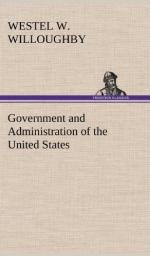Regarding the Silver Question and other important public questions coming within the province of the Treasury Department, information can be derived from recent periodicals. Poole’s Index to Periodical Literature should also be consulted. An interesting account of the Pension Office is contained in the Atlantic Monthly, January, 1890. Regarding the Interstate Commerce Commission, see the book by Don Passes in Putnam’s “Questions of the Day” series. See also Political Science Quarterly, Vol. II, pp. 223 and 369.
The Eleventh Census is now being compiled, and Bulletins are issued from time to time by the superintendent. Postmaster-General Wanamaker has recently issued a pamphlet in support of a Limited Post and Telegraph.
Concerning the constitutional powers possessed by executive officers, see A. Conkling’s Powers of the Executive Departments; de Chambrun’s The Executive Power, and chapter VII of Willoughby’s Supreme Court of the United States. The Official Register of the United States, issued annually in two large volumes, contains the names and positions of all persons in federal employment. The second volume is devoted exclusively to the Postal Service. Very many of the government reports mentioned in this note will be sent to any address upon application.
A descriptive catalogue of all government publications arranged in chronological order, from 1774 to 1881, was prepared by B.P. Poore and published by the government.
Federal Judiciary.
Among the treatises upon the practical working of the Federal Judiciary are: B.R. Curtis’ Federal Courts; Bryce’s American Commonwealth; and Willoughby’s Supreme Court of the United States, already referred to. For an excellent description of the relations between the Federal and State courts, see Chamberlain’s lecture published in The Constitutional History of the United States as seen in the Development of its Law. The reports of decisions of cases tried in the Supreme Court are contained in one hundred and thirty-three volumes. Until 1875, these volumes were known by the names of the reporters, viz.: Dallas, Cranch, Wheaton, Peters, Howard, Black, and Wallace. Since 1875 they have been designated simply as United States Reports.




